Project 2: Organizational Communication Theories and Campus Barriers
VerifiedAdded on 2023/06/10
|8
|2152
|185
Report
AI Summary
This report delves into the core concepts of organizational communication, outlining various theories such as Bureaucracy Theory, Acceptance Theory, General System Theory, and Theory X and Theory Y, providing a comprehensive understanding of how communication shapes organizational structures and employee behavior. The report then evaluates the significant barriers preventing students from returning to campus, including physical, financial, emotional, and listening barriers, as well as the lack of common experiences, highlighting the impact of the pandemic. Finally, the report outlines the strategies implemented by universities to overcome these challenges, such as proper sanitization, maintaining social distance, providing medical facilities, offering alternate classes, and fostering relationship-building activities. This report provides valuable insights into communication dynamics, student challenges, and institutional responses in a changing educational landscape.
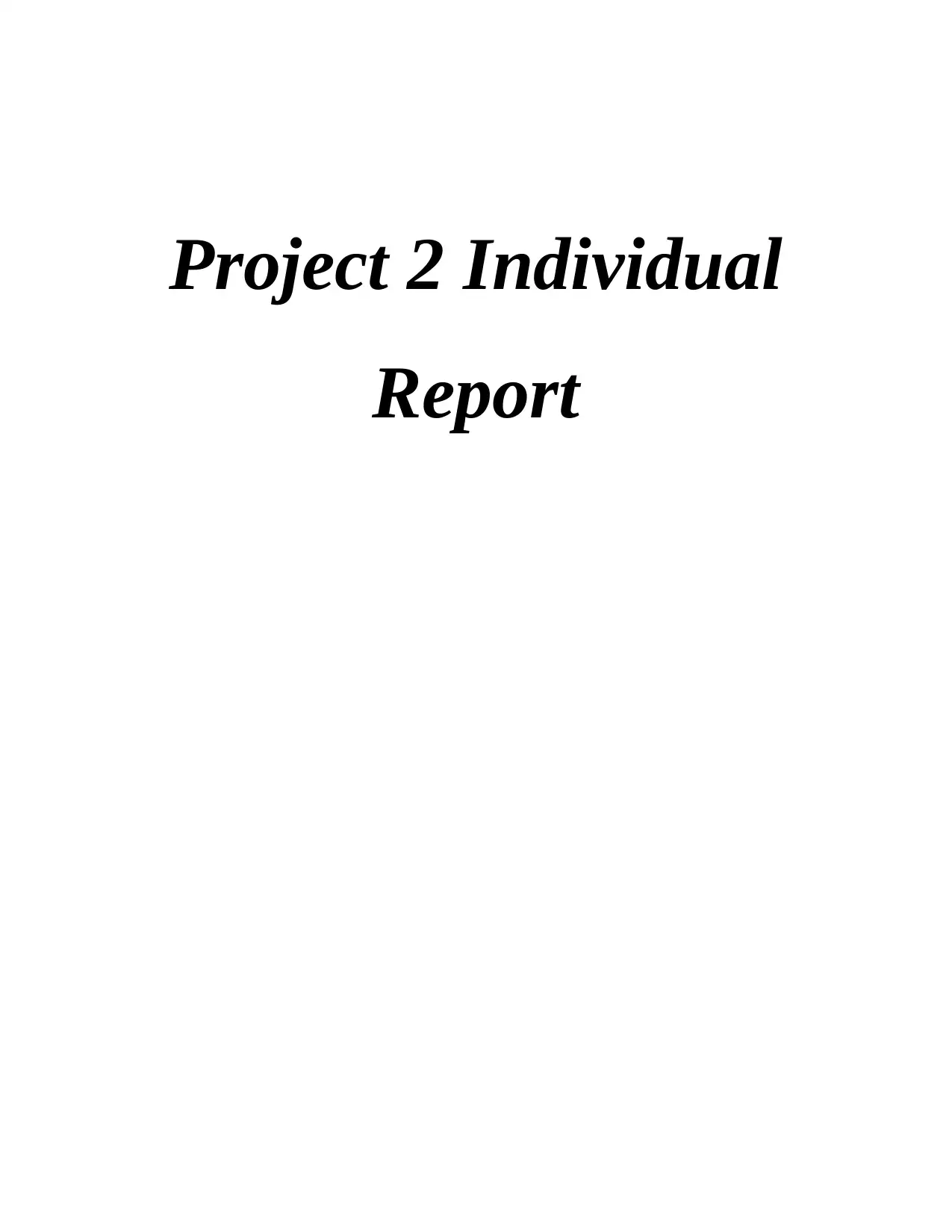
Project 2 Individual
Report
Report
Paraphrase This Document
Need a fresh take? Get an instant paraphrase of this document with our AI Paraphraser
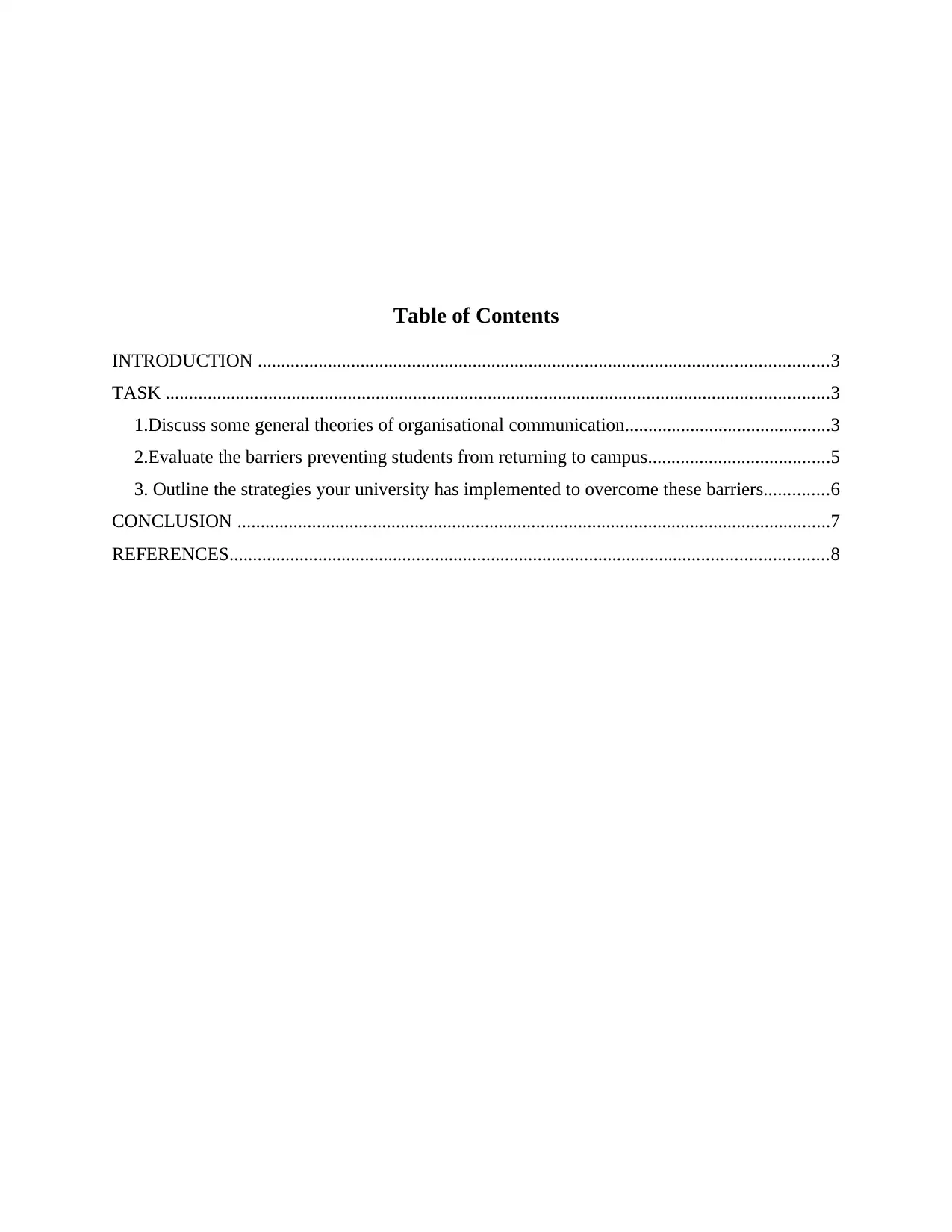
Table of Contents
INTRODUCTION ..........................................................................................................................3
TASK ..............................................................................................................................................3
1.Discuss some general theories of organisational communication............................................3
2.Evaluate the barriers preventing students from returning to campus.......................................5
3. Outline the strategies your university has implemented to overcome these barriers..............6
CONCLUSION ...............................................................................................................................7
REFERENCES................................................................................................................................8
INTRODUCTION ..........................................................................................................................3
TASK ..............................................................................................................................................3
1.Discuss some general theories of organisational communication............................................3
2.Evaluate the barriers preventing students from returning to campus.......................................5
3. Outline the strategies your university has implemented to overcome these barriers..............6
CONCLUSION ...............................................................................................................................7
REFERENCES................................................................................................................................8
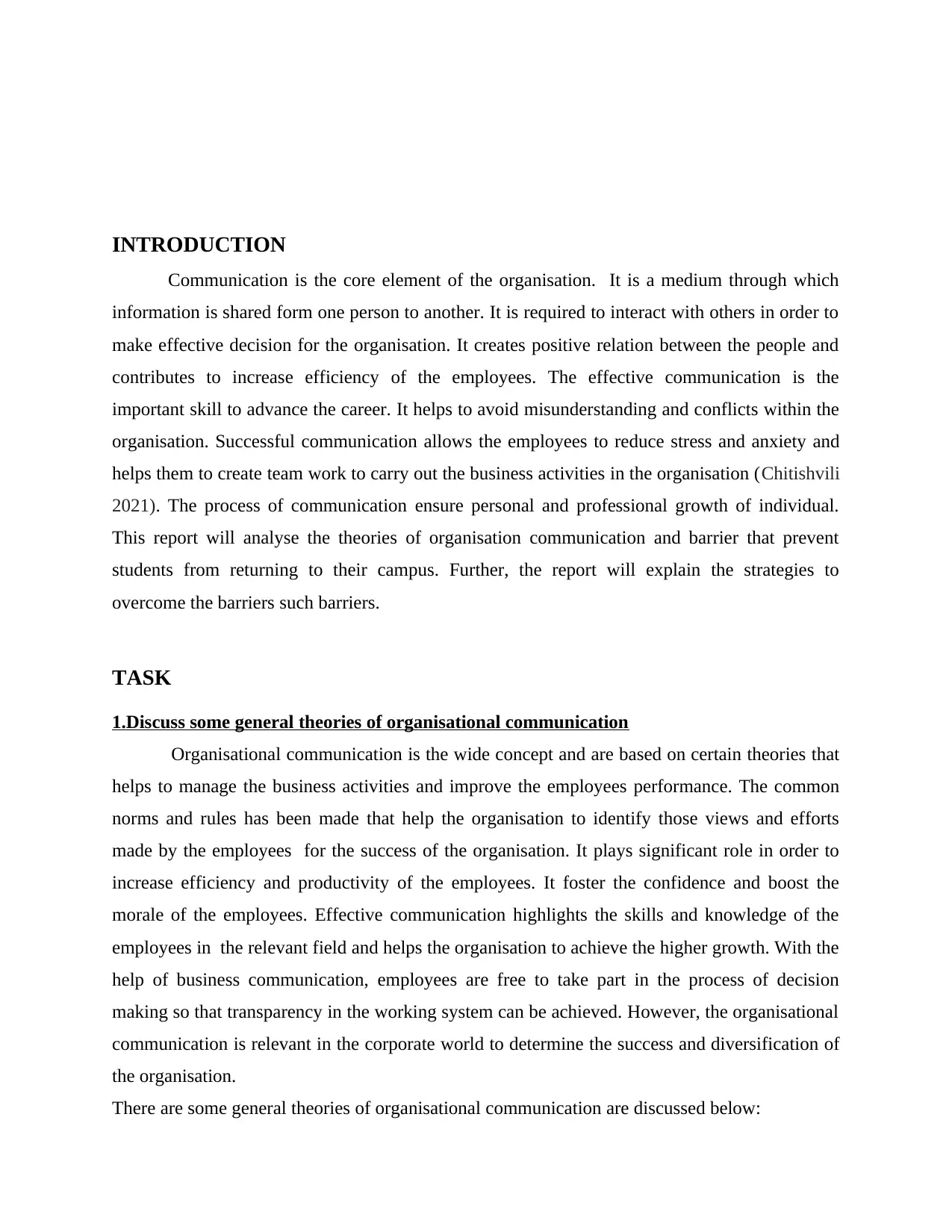
INTRODUCTION
Communication is the core element of the organisation. It is a medium through which
information is shared form one person to another. It is required to interact with others in order to
make effective decision for the organisation. It creates positive relation between the people and
contributes to increase efficiency of the employees. The effective communication is the
important skill to advance the career. It helps to avoid misunderstanding and conflicts within the
organisation. Successful communication allows the employees to reduce stress and anxiety and
helps them to create team work to carry out the business activities in the organisation (Chitishvili
2021). The process of communication ensure personal and professional growth of individual.
This report will analyse the theories of organisation communication and barrier that prevent
students from returning to their campus. Further, the report will explain the strategies to
overcome the barriers such barriers.
TASK
1.Discuss some general theories of organisational communication
Organisational communication is the wide concept and are based on certain theories that
helps to manage the business activities and improve the employees performance. The common
norms and rules has been made that help the organisation to identify those views and efforts
made by the employees for the success of the organisation. It plays significant role in order to
increase efficiency and productivity of the employees. It foster the confidence and boost the
morale of the employees. Effective communication highlights the skills and knowledge of the
employees in the relevant field and helps the organisation to achieve the higher growth. With the
help of business communication, employees are free to take part in the process of decision
making so that transparency in the working system can be achieved. However, the organisational
communication is relevant in the corporate world to determine the success and diversification of
the organisation.
There are some general theories of organisational communication are discussed below:
Communication is the core element of the organisation. It is a medium through which
information is shared form one person to another. It is required to interact with others in order to
make effective decision for the organisation. It creates positive relation between the people and
contributes to increase efficiency of the employees. The effective communication is the
important skill to advance the career. It helps to avoid misunderstanding and conflicts within the
organisation. Successful communication allows the employees to reduce stress and anxiety and
helps them to create team work to carry out the business activities in the organisation (Chitishvili
2021). The process of communication ensure personal and professional growth of individual.
This report will analyse the theories of organisation communication and barrier that prevent
students from returning to their campus. Further, the report will explain the strategies to
overcome the barriers such barriers.
TASK
1.Discuss some general theories of organisational communication
Organisational communication is the wide concept and are based on certain theories that
helps to manage the business activities and improve the employees performance. The common
norms and rules has been made that help the organisation to identify those views and efforts
made by the employees for the success of the organisation. It plays significant role in order to
increase efficiency and productivity of the employees. It foster the confidence and boost the
morale of the employees. Effective communication highlights the skills and knowledge of the
employees in the relevant field and helps the organisation to achieve the higher growth. With the
help of business communication, employees are free to take part in the process of decision
making so that transparency in the working system can be achieved. However, the organisational
communication is relevant in the corporate world to determine the success and diversification of
the organisation.
There are some general theories of organisational communication are discussed below:
⊘ This is a preview!⊘
Do you want full access?
Subscribe today to unlock all pages.

Trusted by 1+ million students worldwide
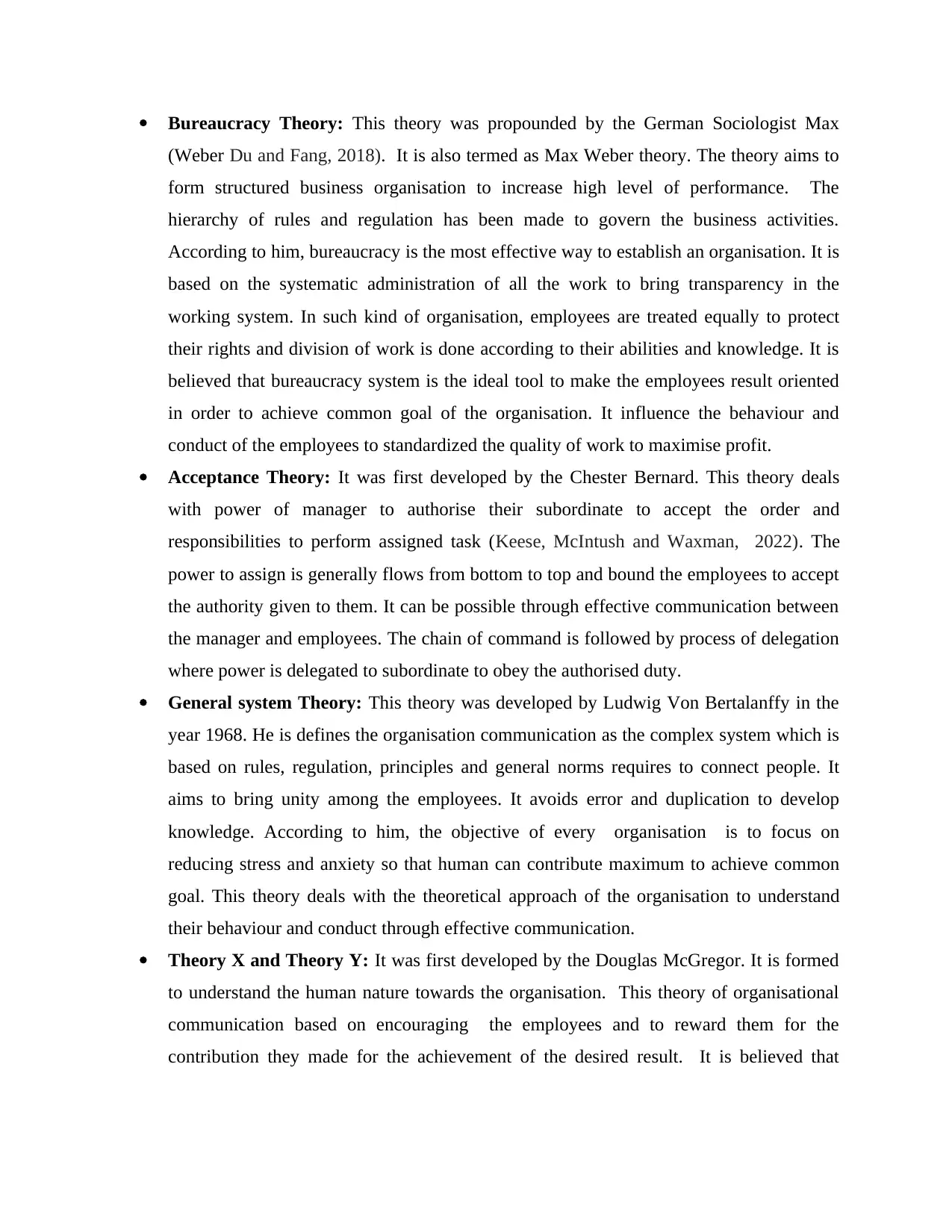
Bureaucracy Theory: This theory was propounded by the German Sociologist Max
(Weber Du and Fang, 2018). It is also termed as Max Weber theory. The theory aims to
form structured business organisation to increase high level of performance. The
hierarchy of rules and regulation has been made to govern the business activities.
According to him, bureaucracy is the most effective way to establish an organisation. It is
based on the systematic administration of all the work to bring transparency in the
working system. In such kind of organisation, employees are treated equally to protect
their rights and division of work is done according to their abilities and knowledge. It is
believed that bureaucracy system is the ideal tool to make the employees result oriented
in order to achieve common goal of the organisation. It influence the behaviour and
conduct of the employees to standardized the quality of work to maximise profit.
Acceptance Theory: It was first developed by the Chester Bernard. This theory deals
with power of manager to authorise their subordinate to accept the order and
responsibilities to perform assigned task (Keese, McIntush and Waxman, 2022). The
power to assign is generally flows from bottom to top and bound the employees to accept
the authority given to them. It can be possible through effective communication between
the manager and employees. The chain of command is followed by process of delegation
where power is delegated to subordinate to obey the authorised duty.
General system Theory: This theory was developed by Ludwig Von Bertalanffy in the
year 1968. He is defines the organisation communication as the complex system which is
based on rules, regulation, principles and general norms requires to connect people. It
aims to bring unity among the employees. It avoids error and duplication to develop
knowledge. According to him, the objective of every organisation is to focus on
reducing stress and anxiety so that human can contribute maximum to achieve common
goal. This theory deals with the theoretical approach of the organisation to understand
their behaviour and conduct through effective communication.
Theory X and Theory Y: It was first developed by the Douglas McGregor. It is formed
to understand the human nature towards the organisation. This theory of organisational
communication based on encouraging the employees and to reward them for the
contribution they made for the achievement of the desired result. It is believed that
(Weber Du and Fang, 2018). It is also termed as Max Weber theory. The theory aims to
form structured business organisation to increase high level of performance. The
hierarchy of rules and regulation has been made to govern the business activities.
According to him, bureaucracy is the most effective way to establish an organisation. It is
based on the systematic administration of all the work to bring transparency in the
working system. In such kind of organisation, employees are treated equally to protect
their rights and division of work is done according to their abilities and knowledge. It is
believed that bureaucracy system is the ideal tool to make the employees result oriented
in order to achieve common goal of the organisation. It influence the behaviour and
conduct of the employees to standardized the quality of work to maximise profit.
Acceptance Theory: It was first developed by the Chester Bernard. This theory deals
with power of manager to authorise their subordinate to accept the order and
responsibilities to perform assigned task (Keese, McIntush and Waxman, 2022). The
power to assign is generally flows from bottom to top and bound the employees to accept
the authority given to them. It can be possible through effective communication between
the manager and employees. The chain of command is followed by process of delegation
where power is delegated to subordinate to obey the authorised duty.
General system Theory: This theory was developed by Ludwig Von Bertalanffy in the
year 1968. He is defines the organisation communication as the complex system which is
based on rules, regulation, principles and general norms requires to connect people. It
aims to bring unity among the employees. It avoids error and duplication to develop
knowledge. According to him, the objective of every organisation is to focus on
reducing stress and anxiety so that human can contribute maximum to achieve common
goal. This theory deals with the theoretical approach of the organisation to understand
their behaviour and conduct through effective communication.
Theory X and Theory Y: It was first developed by the Douglas McGregor. It is formed
to understand the human nature towards the organisation. This theory of organisational
communication based on encouraging the employees and to reward them for the
contribution they made for the achievement of the desired result. It is believed that
Paraphrase This Document
Need a fresh take? Get an instant paraphrase of this document with our AI Paraphraser
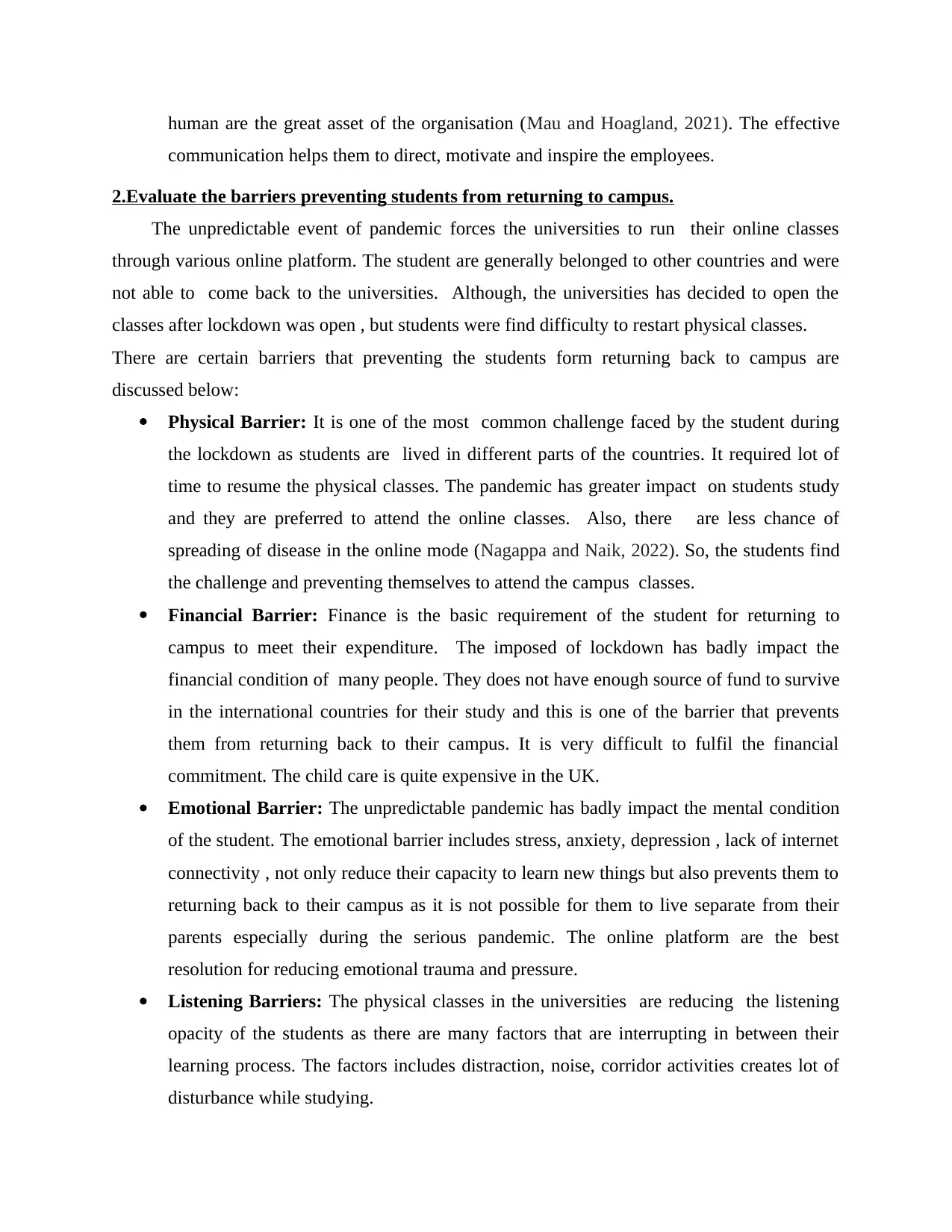
human are the great asset of the organisation (Mau and Hoagland, 2021). The effective
communication helps them to direct, motivate and inspire the employees.
2.Evaluate the barriers preventing students from returning to campus.
The unpredictable event of pandemic forces the universities to run their online classes
through various online platform. The student are generally belonged to other countries and were
not able to come back to the universities. Although, the universities has decided to open the
classes after lockdown was open , but students were find difficulty to restart physical classes.
There are certain barriers that preventing the students form returning back to campus are
discussed below:
Physical Barrier: It is one of the most common challenge faced by the student during
the lockdown as students are lived in different parts of the countries. It required lot of
time to resume the physical classes. The pandemic has greater impact on students study
and they are preferred to attend the online classes. Also, there are less chance of
spreading of disease in the online mode (Nagappa and Naik, 2022). So, the students find
the challenge and preventing themselves to attend the campus classes.
Financial Barrier: Finance is the basic requirement of the student for returning to
campus to meet their expenditure. The imposed of lockdown has badly impact the
financial condition of many people. They does not have enough source of fund to survive
in the international countries for their study and this is one of the barrier that prevents
them from returning back to their campus. It is very difficult to fulfil the financial
commitment. The child care is quite expensive in the UK.
Emotional Barrier: The unpredictable pandemic has badly impact the mental condition
of the student. The emotional barrier includes stress, anxiety, depression , lack of internet
connectivity , not only reduce their capacity to learn new things but also prevents them to
returning back to their campus as it is not possible for them to live separate from their
parents especially during the serious pandemic. The online platform are the best
resolution for reducing emotional trauma and pressure.
Listening Barriers: The physical classes in the universities are reducing the listening
opacity of the students as there are many factors that are interrupting in between their
learning process. The factors includes distraction, noise, corridor activities creates lot of
disturbance while studying.
communication helps them to direct, motivate and inspire the employees.
2.Evaluate the barriers preventing students from returning to campus.
The unpredictable event of pandemic forces the universities to run their online classes
through various online platform. The student are generally belonged to other countries and were
not able to come back to the universities. Although, the universities has decided to open the
classes after lockdown was open , but students were find difficulty to restart physical classes.
There are certain barriers that preventing the students form returning back to campus are
discussed below:
Physical Barrier: It is one of the most common challenge faced by the student during
the lockdown as students are lived in different parts of the countries. It required lot of
time to resume the physical classes. The pandemic has greater impact on students study
and they are preferred to attend the online classes. Also, there are less chance of
spreading of disease in the online mode (Nagappa and Naik, 2022). So, the students find
the challenge and preventing themselves to attend the campus classes.
Financial Barrier: Finance is the basic requirement of the student for returning to
campus to meet their expenditure. The imposed of lockdown has badly impact the
financial condition of many people. They does not have enough source of fund to survive
in the international countries for their study and this is one of the barrier that prevents
them from returning back to their campus. It is very difficult to fulfil the financial
commitment. The child care is quite expensive in the UK.
Emotional Barrier: The unpredictable pandemic has badly impact the mental condition
of the student. The emotional barrier includes stress, anxiety, depression , lack of internet
connectivity , not only reduce their capacity to learn new things but also prevents them to
returning back to their campus as it is not possible for them to live separate from their
parents especially during the serious pandemic. The online platform are the best
resolution for reducing emotional trauma and pressure.
Listening Barriers: The physical classes in the universities are reducing the listening
opacity of the students as there are many factors that are interrupting in between their
learning process. The factors includes distraction, noise, corridor activities creates lot of
disturbance while studying.
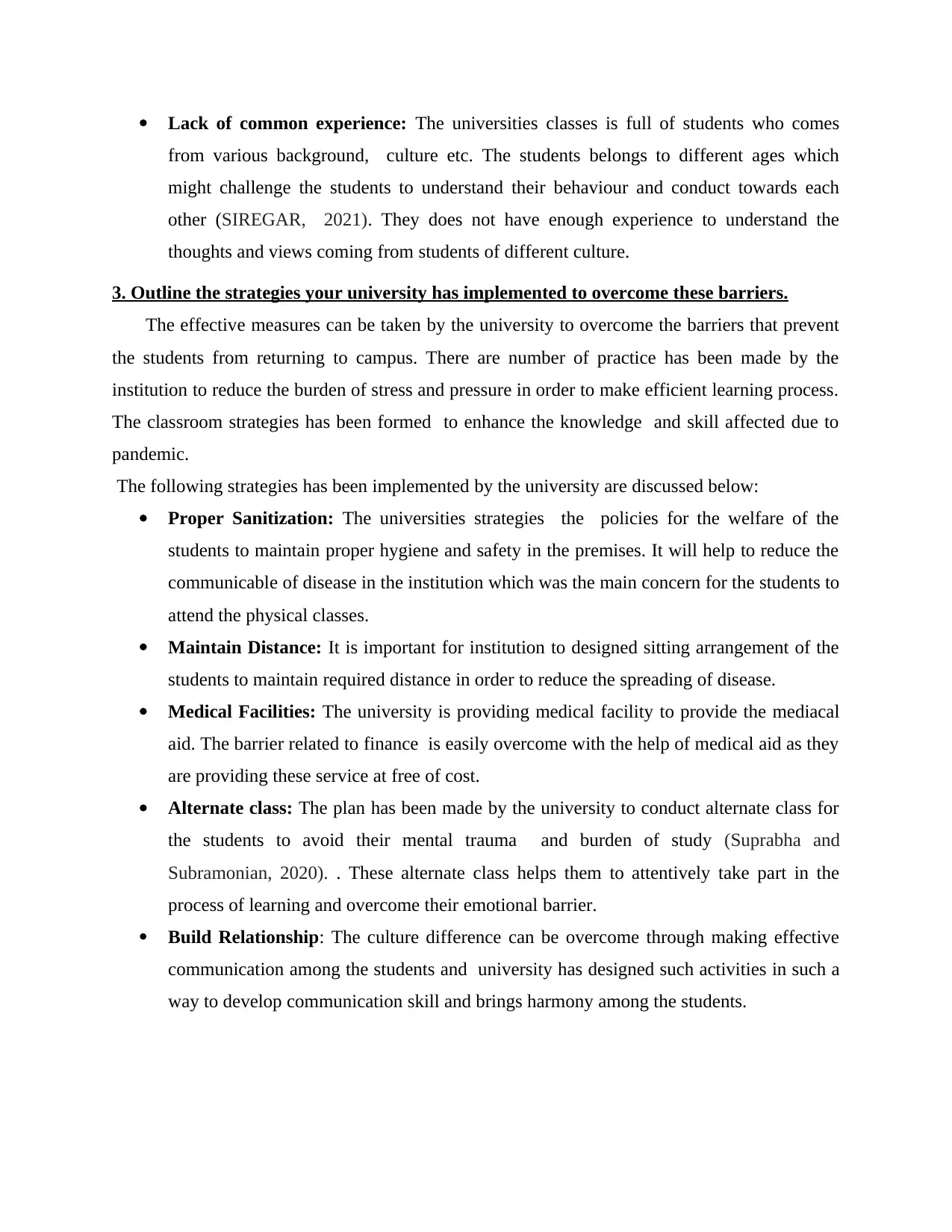
Lack of common experience: The universities classes is full of students who comes
from various background, culture etc. The students belongs to different ages which
might challenge the students to understand their behaviour and conduct towards each
other (SIREGAR, 2021). They does not have enough experience to understand the
thoughts and views coming from students of different culture.
3. Outline the strategies your university has implemented to overcome these barriers.
The effective measures can be taken by the university to overcome the barriers that prevent
the students from returning to campus. There are number of practice has been made by the
institution to reduce the burden of stress and pressure in order to make efficient learning process.
The classroom strategies has been formed to enhance the knowledge and skill affected due to
pandemic.
The following strategies has been implemented by the university are discussed below:
Proper Sanitization: The universities strategies the policies for the welfare of the
students to maintain proper hygiene and safety in the premises. It will help to reduce the
communicable of disease in the institution which was the main concern for the students to
attend the physical classes.
Maintain Distance: It is important for institution to designed sitting arrangement of the
students to maintain required distance in order to reduce the spreading of disease.
Medical Facilities: The university is providing medical facility to provide the mediacal
aid. The barrier related to finance is easily overcome with the help of medical aid as they
are providing these service at free of cost.
Alternate class: The plan has been made by the university to conduct alternate class for
the students to avoid their mental trauma and burden of study (Suprabha and
Subramonian, 2020). . These alternate class helps them to attentively take part in the
process of learning and overcome their emotional barrier.
Build Relationship: The culture difference can be overcome through making effective
communication among the students and university has designed such activities in such a
way to develop communication skill and brings harmony among the students.
from various background, culture etc. The students belongs to different ages which
might challenge the students to understand their behaviour and conduct towards each
other (SIREGAR, 2021). They does not have enough experience to understand the
thoughts and views coming from students of different culture.
3. Outline the strategies your university has implemented to overcome these barriers.
The effective measures can be taken by the university to overcome the barriers that prevent
the students from returning to campus. There are number of practice has been made by the
institution to reduce the burden of stress and pressure in order to make efficient learning process.
The classroom strategies has been formed to enhance the knowledge and skill affected due to
pandemic.
The following strategies has been implemented by the university are discussed below:
Proper Sanitization: The universities strategies the policies for the welfare of the
students to maintain proper hygiene and safety in the premises. It will help to reduce the
communicable of disease in the institution which was the main concern for the students to
attend the physical classes.
Maintain Distance: It is important for institution to designed sitting arrangement of the
students to maintain required distance in order to reduce the spreading of disease.
Medical Facilities: The university is providing medical facility to provide the mediacal
aid. The barrier related to finance is easily overcome with the help of medical aid as they
are providing these service at free of cost.
Alternate class: The plan has been made by the university to conduct alternate class for
the students to avoid their mental trauma and burden of study (Suprabha and
Subramonian, 2020). . These alternate class helps them to attentively take part in the
process of learning and overcome their emotional barrier.
Build Relationship: The culture difference can be overcome through making effective
communication among the students and university has designed such activities in such a
way to develop communication skill and brings harmony among the students.
⊘ This is a preview!⊘
Do you want full access?
Subscribe today to unlock all pages.

Trusted by 1+ million students worldwide
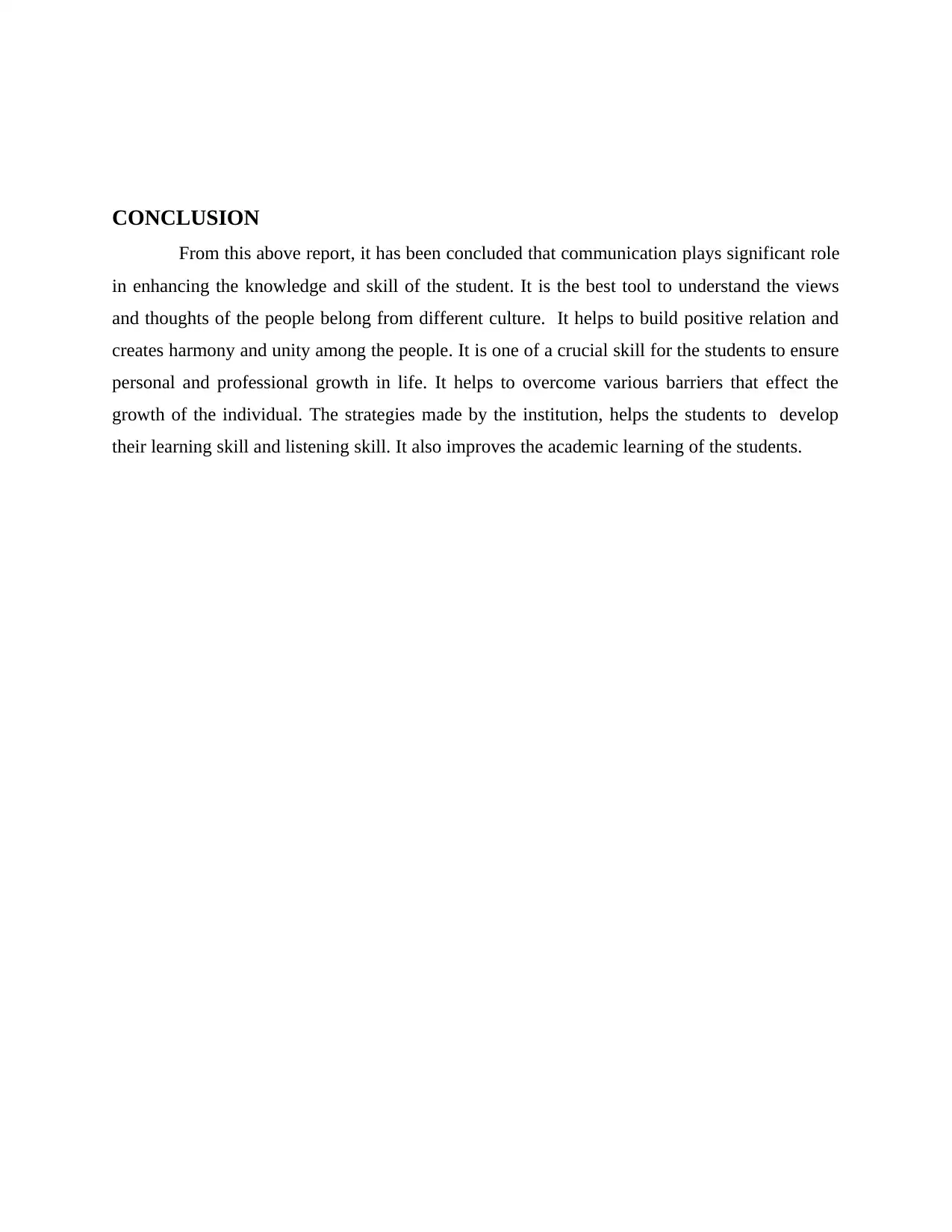
CONCLUSION
From this above report, it has been concluded that communication plays significant role
in enhancing the knowledge and skill of the student. It is the best tool to understand the views
and thoughts of the people belong from different culture. It helps to build positive relation and
creates harmony and unity among the people. It is one of a crucial skill for the students to ensure
personal and professional growth in life. It helps to overcome various barriers that effect the
growth of the individual. The strategies made by the institution, helps the students to develop
their learning skill and listening skill. It also improves the academic learning of the students.
From this above report, it has been concluded that communication plays significant role
in enhancing the knowledge and skill of the student. It is the best tool to understand the views
and thoughts of the people belong from different culture. It helps to build positive relation and
creates harmony and unity among the people. It is one of a crucial skill for the students to ensure
personal and professional growth in life. It helps to overcome various barriers that effect the
growth of the individual. The strategies made by the institution, helps the students to develop
their learning skill and listening skill. It also improves the academic learning of the students.
Paraphrase This Document
Need a fresh take? Get an instant paraphrase of this document with our AI Paraphraser
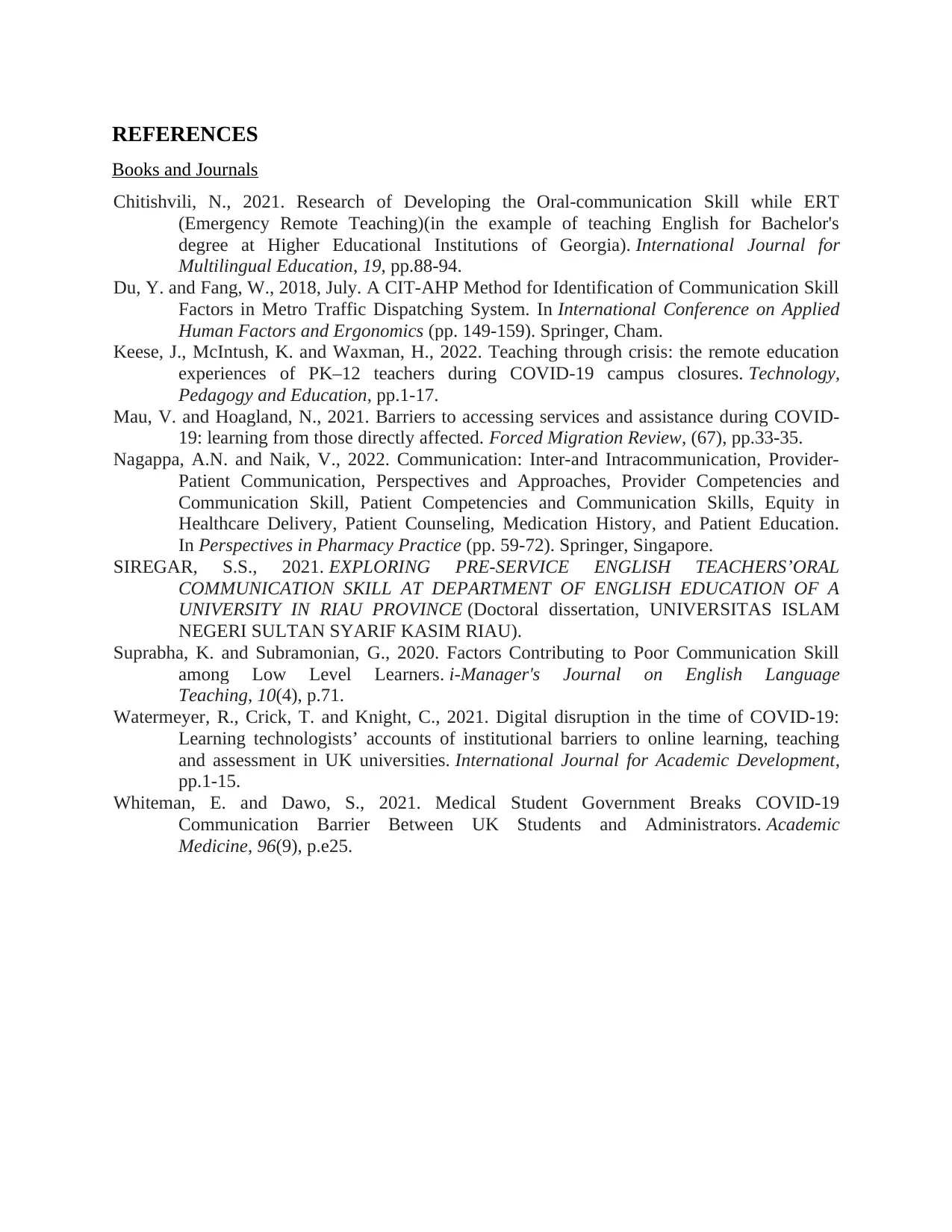
REFERENCES
Books and Journals
Chitishvili, N., 2021. Research of Developing the Oral-communication Skill while ERT
(Emergency Remote Teaching)(in the example of teaching English for Bachelor's
degree at Higher Educational Institutions of Georgia). International Journal for
Multilingual Education, 19, pp.88-94.
Du, Y. and Fang, W., 2018, July. A CIT-AHP Method for Identification of Communication Skill
Factors in Metro Traffic Dispatching System. In International Conference on Applied
Human Factors and Ergonomics (pp. 149-159). Springer, Cham.
Keese, J., McIntush, K. and Waxman, H., 2022. Teaching through crisis: the remote education
experiences of PK–12 teachers during COVID-19 campus closures. Technology,
Pedagogy and Education, pp.1-17.
Mau, V. and Hoagland, N., 2021. Barriers to accessing services and assistance during COVID-
19: learning from those directly affected. Forced Migration Review, (67), pp.33-35.
Nagappa, A.N. and Naik, V., 2022. Communication: Inter-and Intracommunication, Provider-
Patient Communication, Perspectives and Approaches, Provider Competencies and
Communication Skill, Patient Competencies and Communication Skills, Equity in
Healthcare Delivery, Patient Counseling, Medication History, and Patient Education.
In Perspectives in Pharmacy Practice (pp. 59-72). Springer, Singapore.
SIREGAR, S.S., 2021. EXPLORING PRE-SERVICE ENGLISH TEACHERS’ORAL
COMMUNICATION SKILL AT DEPARTMENT OF ENGLISH EDUCATION OF A
UNIVERSITY IN RIAU PROVINCE (Doctoral dissertation, UNIVERSITAS ISLAM
NEGERI SULTAN SYARIF KASIM RIAU).
Suprabha, K. and Subramonian, G., 2020. Factors Contributing to Poor Communication Skill
among Low Level Learners. i-Manager's Journal on English Language
Teaching, 10(4), p.71.
Watermeyer, R., Crick, T. and Knight, C., 2021. Digital disruption in the time of COVID-19:
Learning technologists’ accounts of institutional barriers to online learning, teaching
and assessment in UK universities. International Journal for Academic Development,
pp.1-15.
Whiteman, E. and Dawo, S., 2021. Medical Student Government Breaks COVID-19
Communication Barrier Between UK Students and Administrators. Academic
Medicine, 96(9), p.e25.
Books and Journals
Chitishvili, N., 2021. Research of Developing the Oral-communication Skill while ERT
(Emergency Remote Teaching)(in the example of teaching English for Bachelor's
degree at Higher Educational Institutions of Georgia). International Journal for
Multilingual Education, 19, pp.88-94.
Du, Y. and Fang, W., 2018, July. A CIT-AHP Method for Identification of Communication Skill
Factors in Metro Traffic Dispatching System. In International Conference on Applied
Human Factors and Ergonomics (pp. 149-159). Springer, Cham.
Keese, J., McIntush, K. and Waxman, H., 2022. Teaching through crisis: the remote education
experiences of PK–12 teachers during COVID-19 campus closures. Technology,
Pedagogy and Education, pp.1-17.
Mau, V. and Hoagland, N., 2021. Barriers to accessing services and assistance during COVID-
19: learning from those directly affected. Forced Migration Review, (67), pp.33-35.
Nagappa, A.N. and Naik, V., 2022. Communication: Inter-and Intracommunication, Provider-
Patient Communication, Perspectives and Approaches, Provider Competencies and
Communication Skill, Patient Competencies and Communication Skills, Equity in
Healthcare Delivery, Patient Counseling, Medication History, and Patient Education.
In Perspectives in Pharmacy Practice (pp. 59-72). Springer, Singapore.
SIREGAR, S.S., 2021. EXPLORING PRE-SERVICE ENGLISH TEACHERS’ORAL
COMMUNICATION SKILL AT DEPARTMENT OF ENGLISH EDUCATION OF A
UNIVERSITY IN RIAU PROVINCE (Doctoral dissertation, UNIVERSITAS ISLAM
NEGERI SULTAN SYARIF KASIM RIAU).
Suprabha, K. and Subramonian, G., 2020. Factors Contributing to Poor Communication Skill
among Low Level Learners. i-Manager's Journal on English Language
Teaching, 10(4), p.71.
Watermeyer, R., Crick, T. and Knight, C., 2021. Digital disruption in the time of COVID-19:
Learning technologists’ accounts of institutional barriers to online learning, teaching
and assessment in UK universities. International Journal for Academic Development,
pp.1-15.
Whiteman, E. and Dawo, S., 2021. Medical Student Government Breaks COVID-19
Communication Barrier Between UK Students and Administrators. Academic
Medicine, 96(9), p.e25.
1 out of 8
Related Documents
Your All-in-One AI-Powered Toolkit for Academic Success.
+13062052269
info@desklib.com
Available 24*7 on WhatsApp / Email
![[object Object]](/_next/static/media/star-bottom.7253800d.svg)
Unlock your academic potential
Copyright © 2020–2026 A2Z Services. All Rights Reserved. Developed and managed by ZUCOL.




